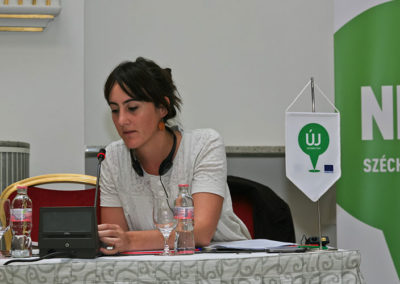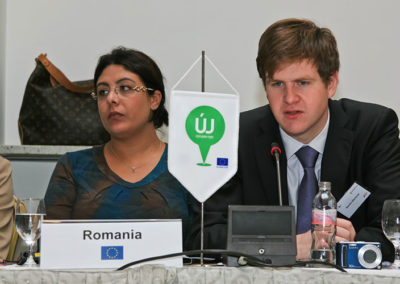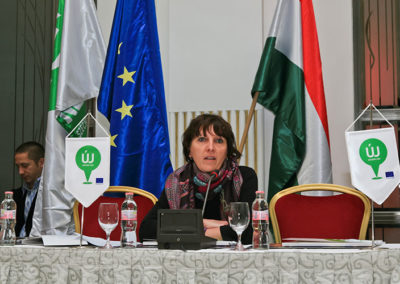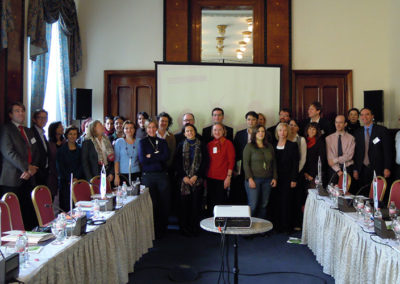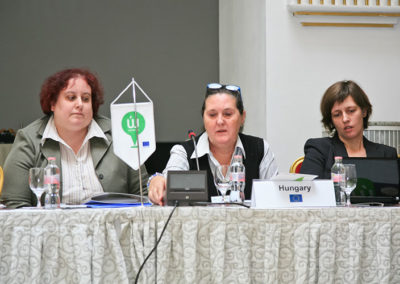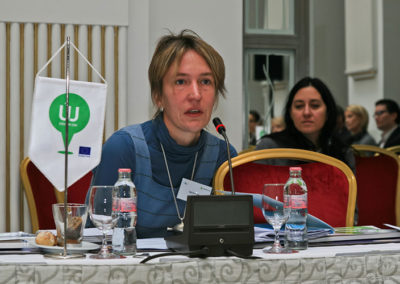The EURoma Network held its half-yearly meeting on 10th-11th November in the city of Budapest, hosted by the Hungarian partners. The meeting gathered some 70 participants, including Structural Funds Managing Authorities and public bodies in charge of Roma policies from the 12 Member States currently involved in the Network, as well as European Commission’s representatives and other relevant stakeholders, and EURoma Technical Secretariat.
The half-yearly meeting of the EURoma Network brought together 68 participants to discuss a wide range of topics related to Roma and Structural Funds which are currently on the European agenda. Participants included Network partners – Structural Funds Managing Authorities and the bodies in charge of Roma policies- from 12 EU Member States, European Commission’s representatives (DG Employment, Social Affairs and Inclusion Opportunities and DG Regional Policy) and other relevant stakeholders as well as EURoma Technical Secretariat (Fundación Secretariado Gitano).
Representatives from a number of initiatives which building on their knowledge and experience could provide a relevant feedback were invited to join the meeting, including the Roma Education Fund (REF), the World Bank and the EU Fundamental Rights Agency.
Mr. Tamás Palicz, Head of Human Resources Programme Managing Authority from the National Development Agency, together with Mrs. Katalin Langerné Victor, from the State Secretariat for Social Inclusion of the Ministry of Public Administration and Justice, and Mr. László Berényi vice-chairman of the National Roma Council (NRC) were in charge of opening the session, providing participants with an overall picture of the Hungarian context.
The meeting’s agenda featured the following topics:
The role of Structural Funds in the promotion of Roma education
Participants reviewed the current situation regarding the use of Structural Funds for Roma education and the potential of these funds to support new initiatives in this area. This topic was analysed considering the relevance given to education in the EU2020 Strategy, which sets a really concrete goal regarding early drop-out, the Commission’s proposal for the future Structural Funds regulations (2014-2020) and the EU Framework for National Roma Integration Strategies, in which education is one of the four priority areas for action. Following a presentation of the general framework regarding the role of Structural Funds in Roma education by EURoma Technical Secretariat, concrete experiences from Hungary, Greece, Romania and Spain were presented and used to analyse the added value of Structural Funds and identify keys for intervention for future projects, namely:
- Hungarian Educational Integration Programme: Mr Iván Sörös, State Secretariat for Social Inclusion, Ministry of Public Administration and Justice, Human Resources Development OP, Hungary
- Promotion of inter-cultural education: Mrs Chrisoula Arcoudis, National and Kapodistrian University of Athens, Multi-cultural education OP, Greece
- Tackling Roma early school leaving: Mr Humberto García, FSG. PROMOCIONA Programme, OP Fight against Discrimination, Spain
- School after School: Mr Florin Nasture, Roma Education Fund (REF), Human Resource Development OP, Romania
Evaluation of the use of the Structural Funds building on two presentations:
- Evaluation of ESF support for enhancing access to the labour market and the social inclusion of migrants and ethnic minorities, European Commission. Dominique Be, Deputy Head of Unit, ESF Coordination, DG Employment, Social Affairs and Inclusion
- Evaluation of the use of the Structural Funds for Roma integration in Hungary (Inception Report), Pannon Elemző Iroda
Future Regulations of the Structural Funds (2014-2020)
The European Commission provided an overview of the proposals for the future Regulations of the Structural Funds (2014-2020) which were recently presented. Commission’s representatives identified new elements proposed for the new programming period, analysed how Roma inclusion is approached and stressed the new opportunities and risks offered for social inclusion in general and Roma social inclusion in particular.
- Enrica Chiozza, DG Regional Policy, European Commission
- Dominique Be, Deputy Head of Unit, ESF Coordination, DG Employment, Social Affairs and Inclusion, European Commission
The future National Strategies for Roma Inclusion and the contribution of Structural Funds
Only a few weeks away from the deadline set by the European Commission to Member States to present their National Strategies, participants reviewed the current state-of-play regarding the elaboration of the Strategies in each country. The meeting offered an excellent opportunity to exchange information about issues such as the content, the processes, the limitations, etc. as well as to identify those aspects in which Structural Funds could help support and promote the development of the National Strategies. The Network also collected proposals regarding inter alia the introduction of the objectives set in the Strategies in the context of the Operational Programmes, the improvement of coordination mechanisms between Structural Funds Managing Authorities and the bodies in charge of the Strategies and the use of Technical Assistance.
Proposals for a more efficient use of the Structural Funds
World Bank representative presented data collection and evaluation method and tools used, including the “poverty maps”, which provide a detailed description of the spatial distribution of poverty and inequality within a country. In particular, participants had the opportunity to hear about the Hungarian poverty mapping.
- Creating poverty maps. Joost de Laat, World Bank
- The Hungarian poverty mapping, Adam Kullman, Open Society Foundations
- Data collection and evaluation method and tools (based on the ECD Pilot Project), Joost de Laat, World Bank
Participants also had the opportunity to discuss on the future EURoma Practical Guide for Operational Programmes 2014-2020 (to be published in 2012) following the presentation by José Manuel Fresno, Advisor to the Technical Secretariat.
To obtain further information on the meeting, please contact the Secretariat of the Network at info@euromanet.com
RELATED DOCUMNETS
- Agenda
- Opening session: Presentation by László Berényi, Vice-chairman, Hungarian National Roma Council (NRC)
- Structural Funds and Roma Education: General Policy Framework, Belén Sánchez-Rubio, EURoma Technical Secretariat
- Structural Funds and Roma Education: Hungarian Educational Integration Program, Iván Sörös, State Secretariat for Social Inclusion, Ministry of Public Administration and Justice, Human Resources Development OP, Hungary
- Structural Funds and Roma Education: Promotion of Intercultural Education in Greece, Chrisoula Arcoudis, National and Kapodistrian University of Athens, Multi-cultural education OP, Greece
- Structural Funds and Roma Education: Tackling Roma early school leaving, Humberto García, Fundación Secretariado Gitano (FSG), Promociona Programme, OP Fight against Discrimination, Spain
- Structural Funds and Roma Education: School after School, Florin Nasture, Roma Education Fund (REF), Human Resource Development OP, Romania
- Evaluation of ESF support for enhancing access to the labour market and the social inclusion of migrants and ethnic minorities, Dominique Be, European Commission, Deputy Head of Unit ESF Coordination, DG Employment, Social Affairs and Inclusion
- Evaluation of the use of the Structural Funds for Roma integration in Hungary (Inception Report). Pannon Elemző Iroda
- Future Regulations of the Structural Funds (2014-2020): Enrica Chiozza, DG Regional Policy, European Commission
- Future Regulatiions of Structural Funds (2014-2020): Dominique Be, Dominique Be, European Commission, Deputy Head of Unit ESF Coordination, DG Employment, Social Affairs and Inclusion
- Efficient use of Structural Funds: Creating poverty maps, Joost de Laat, World Bank
- Efficient Use of Structural Funds: Poverty Map in Hungary, Adam Kullman, Open Society Foundations
- EURoma Practical Guide for Operational Programmes 2014-2020, José Manuel Fresno, Advisor to the Technical Secretariat

